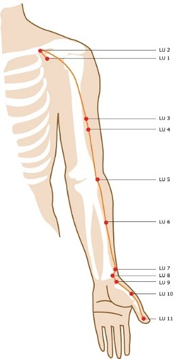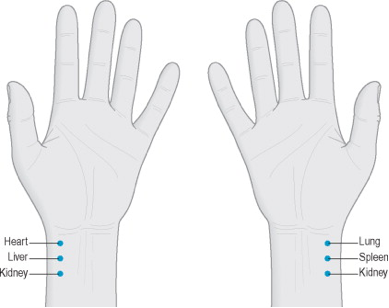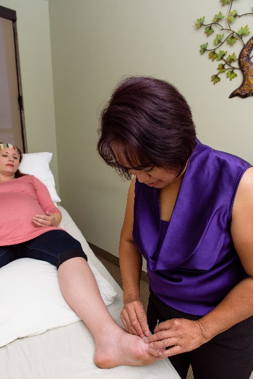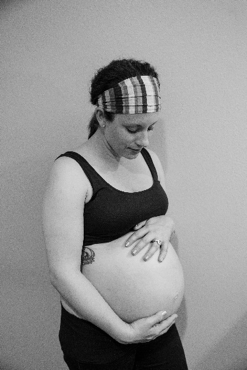Acupuncture for Fertility:
Getting Pregnant, Childbirth Preparation, and Post Partum
By: Christabel Tabbada, LAc.
Bend, OR
Acupuncture originated in China over 3000 years ago. Although the earliest primitive acupuncture needles of long sharpened bones date back to 6000 BC, the earliest records of Chinese Medicine writings on gynecology and obstetrics go back to the Shang dynasty in 1500 – 1000 BC. The earliest surviving book focused entirely on obstetrics called “Treasure of Obstetrics” (Jing Xiao Chan Bao) was written during the Tang Dynasty in 618 to 906 AD. This book detailed how Chinese Medicine addressed difficult conditions during pregnancies, birthing and post-partum.
Ironically, acupuncture was essentially unknown to the Western world until the early 1970s. In fact, the use of acupuncture for obstetrics and gynecology has not garnered much attention until only the last two decades. This surge of interest was mainly driven because women are facing more and more demands of the modern industrial world. Consequently women, like myself, are challenged with difficulties with fertility, pregnancy, birthing and post-partum.
My first introduction to acupuncture came after I was diagnosed with PCOS (Polycystic Ovarian Syndrome) when I was 24 years old. For many years, I had not gotten a clear answer as to why my periods were irregular. I investigated acupuncture as an alternative to taking birth control hormones that my OB/Gyn prescribed to regulate my periods. The success of the treatments I received inspired me to study acupuncture and Traditional Chinese Medicine (TCM) four years later, leaving my corporate career behind. My TCM studies were focused mainly on female hormone regulation and fertility. However, my drive and passion for pregnancy, birth and post-partum care truly came to the forefront during my first pregnancy, my unexpected birthing by C-section and my subsequent experience with post-partum depression.
For this reason, my sincerest hope is that my experience, my knowledge and this body of work can be a resource and give guidance to any woman that is seeking such answers. This article will go through TCM perspectives and use of acupuncture to address issues associated with conception, pregnancy, birthing and beyond.
The Basics: How Does Acupuncture Work?
Acupuncture is only one branch within the broad tree of Traditional Chinese Medicine (TCM). TCM practice also includes herbal medicine, Tui Na massage, Qi Gong movement exercises, Moxibustion, Cupping and dietary therapy. TCM is focused on balancing the body’s energy to promote healing and improve functioning. Acupuncture involves specific placement of thin needles to assist the body in preventing and treatment of illnesses. Acupuncture directs the flow of energy, aka chi, throughout the body along the defined pathways called meridians or channels. Each meridian is connected to specific internal body organ, a local body segment in which the meridian runs along, and an emotional spiritual component. For example, acupuncture points along the Lung channel address issues with the Lung organ; the channel of the body from the lateral chest down the arm and ends at the thumb; and deals with the emotion of grief.
To further differentiate the cause and pattern of the body’s imbalances and disharmony, the acupuncturist will look at the patient’s tongue and feel their pulses. The tongue is viewed for general appearance, physical shape, color and coating. Feeling the pulse in TCM is not for counting beats per minute but rather to find out the state of internal functioning of each organ represented on the person’s wrists. Both tongue and pulse diagnosis will give insights to a person’s state of health, from vibrancy to illness.
Your body is an exquisite healing machine. It is capable of regenerating (not arms and legs and tails like some lizards) but bones, tissues, organs. It is capable of restoring balance, strength, and agility. It is capable of literally rebuilding itself in fairly short order- given the right tools. The foundation of the body's essential tool kit is a diet consisting of whole, real, foods filled with the nutrients that the body craves for its wellbeing.


Planning For Conception And A Healthy Baby:
The ultimate goal for couples looking to start a family is to birth a healthy baby. Healthy parents produce healthy babies. My role as an acupuncturist is to optimize the parent’s health before conception occurs to positively influence the health of their unborn child. For those working on family planning, I recommend acupuncture treatments to start at least 3 months before trying to conceive. In this manner, we can address any imbalances or deficiencies that the patient may have. A woman entering pregnancy with chronic imbalances or deficiencies is more likely to have challenges during her pregnancy.
Common chronic imbalances most often involve the Liver, Kidney and Spleen/Stomach organs, as these organs are responsible for the body’s reproductive functions. Imbalance of the Liver gives rise to PMS symptoms like breast distension, irritability, and abdominal pain, scanty or heavy period. Kidney imbalances manifest as low back pain, edema, difficult conceiving, or miscarriage. Spleen/Stomach imbalance impacts digestion and results in nausea, morning sickness, acid reflux, etc. All of which can be addressed with acupuncture, appropriate lifestyle adjustments and optimizing the parent’s diet and nutrition.
Acupuncture sessions are weekly and work in coordination with the different phases of her cycle. The days post-period, the Blood and Yin are deficient and acupoints are utilized to build up Blood and nourish the Qi and Yin. Whereas, during the four days around her ovulation period, we are promoting the ease of egg release from the ovary and smooth flow of Qi allowing for easy conception and connection of the fertilized egg to the uterine wall. And lastly, the post-ovulation phase is where we focus on building the Yang energy to aid in either cellular division of the fertilized egg or to start the uterine lining shedding which results in a period. This is the reason why regulating the menstrual cycle is crucial for family planning.
Stages of Pregnancy:
During pregnancy, unlike any other time in a woman’s life, is where she is most likely to look for natural remedies and non-invasive, drug-free treatments to avoid possibly harming her unborn child. In every stage of pregnancy, both mom and baby will go through tremendous growth and significant changes. These, of course, will lead to certain challenges for the expectant mom which are driven by and directly impact her unborn child. Note that, although not discussed in detail here, the most important contribution to a healthy pregnancy, parent and child is good nutrition. Optimum nutrition greatly increases the chances of having a healthy trouble-free pregnancy. Most importantly, optimum nutrition during pregnancy has a profound impact on the health of the child for the rest of its life.
First Trimester: 1 to 12 weeks
The first 3 months of pregnancy is when all the baby’s organs, hands, feet and limbs are formed. This is a period where the baby undergoes rapid growth spurts. The expectant mom often feels overwhelming tiredness and may experience either hunger and cravings or nausea and vomiting. She may even flip from one extreme to the other.
As an acupuncturist, the most common conditions I treat during the first trimester are morning sickness and fatigue. Some associated symptoms are cravings, food aversion, heartburn, belching, and smell sensitivity. In TCM, these conditions are commonly affected by organ disharmony of the Spleen/Stomach, the Liver and the Kidneys. The vomiting is due to Rebellious Stomach Qi. Nausea is caused by deficient Spleen while fatigue is both Spleen and Kidney Qi deficiency. Liver and Stomach disharmony is often due to long term emotional issues. Acupuncture points are selected to tonify the deficiency in the Spleen and Stomach, calm the Stomach rebellious Qi and relax the Liver Qi agitation.
Second Trimester: 13 to 28 weeks
During the middle of pregnancy, the change in the woman’s body shape is more noticeable. The feelings of nausea and tiredness recede, while her appetite increase. Meanwhile the baby continues to grow, its organs are maturing, its bones are hardening, and air passages are developing. The ailments experienced at this point are mostly minor but may cause various degrees of discomfort and anxiety for the expectant mom. Some common conditions treated include heartburn, constipation, hemorrhoids, back ache, and sciatica. Acupoints are selected to strengthen digestion of the Spleen and Stomach channels for heartburn and constipation; smoothing and promoting movement of Liver Qi and Blood for hemorrhoids, back ache and sciatica; and tonifying Kidney Qi for back ache and increasing the woman’s general vitality. In addition, dietary and lifestyle adjustments like avoiding large meals and fatty/spicy foods, walking and/or stretching, etc. may be advised, where appropriate.
Third Trimester: 28 to 40 weeks
The final months of pregnancy, the baby grows faster than ever, doubling in size, bulking up its fat stores, the number of nerve cells increase, crucial growth spurts in the brain occur, lungs and immune system mature, the digestive tract develops, and bones elongate and strengthen. Common ailments of the third trimester the mom experiences include: anemia, cramps, insomnia, abdominal pain, edema, anxiety, premature birth waves. Again, appropriate acupoints on the associated meridian are selected for specific ailments. At this stage, the woman’s belly is significant and treatment positions are limited. Most often, table treatment requires a large foam wedge pillow to avoid obstructing the blood flow of the main vein carrying the blood from the lower body. Side-lying may also be appropriate for some women to alleviate the heaviness of her rounded belly. The last four weeks are usually done sitting up or on a slightly reclined chair.


Third Trimester Continued... Acupuncture and Birth Preparation
It is also at this stage where preparation for birth occurs. Mentally and emotionally, bringing a new life often requires emotional adjustments. Mothers need to prepare emotionally and physically to the transformation involved with becoming a parent. Some women, especially first-time mothers, will experience increasing anxiety about birthing. Talking through the mom’s fears and calming their nervous system with acupuncture goes a long way to ensuring the mother can be calm, rest and prepare herself. Also, between 32 to 35 weeks we want to ensure the baby is in the appropriate position for birthing. Acupuncture and moxibustion can assist with turning breeched or abnormal positioned babies given there is enough space in the uterus and there are no obstructions, i.e. cord wrapping, a uterine septum, etc. Additionally, from 36 weeks on, acupuncture treatment is recommended weekly to prepare the mom for birthing. I call these sessions the “ripening” which help soften the cervix for effacement, e-stim of specific acupoints to lightly stimulate the uterus which helps with dilation and promotes smooth consistent pressure waves during birthing.
Birthing Time:
After going through all the stages of pregnancy, its unreal how quickly the birthing time arrives. Acupoints are applied according to the different stages of birthing. During the first stage of birthing, the woman is working through pressure waves to complete effacement and achieve full dilation of the cervix. During this time, the mom tends to be mobile, trying to manage any discomfort from pressure waves by utilizing varying positions. Acupuncture is applied to areas like the ear, hand or foot, so as not to obstruct the birthing mom’s movement while at the same time providing discomfort relief and stimulating consistent pressure waves. If the first stage is prolonged, depending on the birthing mom’s body needs, acupuncture can aid birthing waves to reach transformation more efficiently. Or acupuncture can calm her nervous system enough to give her body a short respite to rest and recharge her energy and motivation to reach transformation. During the second stage of birthing, the woman goes from full cervical dilation to the birth of her baby. Although there are not a lot of needles applied during this stage, the role of the acupuncturist becomes crucial if birthing waves stop or the period between waves lengthen, which can happen if the mother becomes exhausted. Acupuncture is rarely administered during the third stage of a normal birth, which involves the expulsion of the placenta and membranes. There are definitely acupuncture treatments for excessive postpartum bleeding or retained placenta. However, because these situations can become life threatening quickly, it’s advisable to seek immediately emergency medical attention.
Beyond Birthing
Post-partum is probably the most important time for the new mom to get acupuncture care. Most expectant parents are so totally focused on pregnancy and birthing that they don’t consider what a new mom needs to recover from her birthing experience. Giving birth is a big shock to a new mother’s system. Yet, Western medicine and the general workforce expect a new mother to make her recovery in the 6 weeks after the birth of her baby, often times without guidance or assistance. Not only are there significant mental and emotional adjustments that need to be made to care for the new baby, but she is further challenged when her hormone levels drop dramatically after birthing. Some new mothers may even experience post-partum depression. A new mom also has to adapt to functioning through sleep deprivation from constant nursing, manage with discomfort and pain in the birthing area, and so much more. There is much that an acupuncturist can do to enhance the mother’s recovery and well-being. Many post-partum problems such as breastfeeding problems, urinary problems, after pains, perineal soreness and common patterns of disharmony, to name a few, can all be aided with acupuncture. At whatever stage you may be in your journey of growing a family, I hope acupuncture is or will be part of it.
References:
• Maciocia, Giovanni. Obstetrics & Gynecology in Chinese Medicine. Churchill Livingston, 1998
• West, Zita. Acupuncture In Pregnancy And Childbirth. Churchill Livingston, 2001